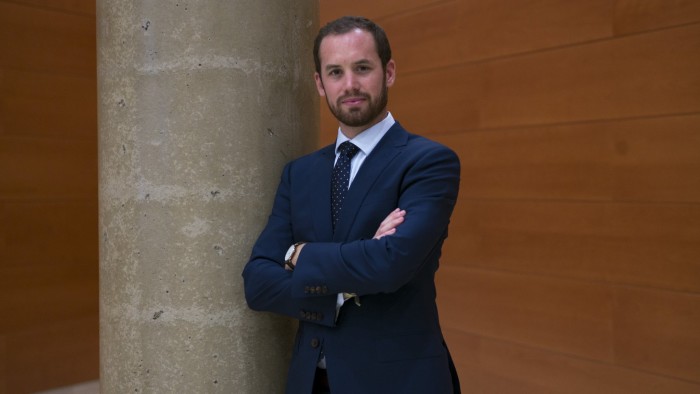Barcelona business schools braced for fallout from Catalan crisis
Roula Khalaf, Editor of the FT, selects her favourite stories in this weekly newsletter.

Until he moved to Barcelona last month to start his MBA studies at Iese Business School, Michael Wurth had only ever visited Spain as a tourist. Neither the terrorist attack in the city in August that killed 13 people nor the Catalan independence referendum this month deterred the 28-year-old American from joining a course that he hopes will help him fulfil a long-held ambition to start a business.
But he describes the mood on the streets of Barcelona — where he is living with the family of a Spanish friend — as hostile. “Every day you see people leaning from their windows banging pots and pans. There is a very tense atmosphere,” he says.
More than 2m people turned out to vote to break away from Spain in defiance of Madrid. The Catalan independence vote has unnerved the region’s businesses, including banks and construction companies. Several have prepared to counter any split with the rest of Spain by moving their headquarters outside Catalonia.
Barcelona’s two highly ranked business schools, Iese (10th in the FT’s global MBA table) and Esade (17th), fear that the unrest will be as damaging as Donald Trump’s election has been to US business schools. In the US, a fall in applications is blamed on the president; similarly, the Brexit vote to leave the EU has adversely affected UK institutions.
Esade compiles an annual audit of MBA students in cities worldwide. This year the total for Barcelona was 924 full-time students, making it the sixth-largest cohort in any city, ahead of Silicon Valley and level with Toronto.
Alfons Sauquet, quality services director for EFMD, the business school accreditation body, and a former global dean of Esade, admits that the constitutional crisis in Catalonia could be “as damaging as Brexit” was for UK schools, where after the vote, many foreign students did not show up at the start of the academic year in 2016. However, he insists that the brands of Esade and Iese are “solid enough” to recover if the unrest proves to be temporary.
“The real damage will depend on how chronic this is and how long it remains in the headlines,” Mr Sauquet says, adding that it is likely to be more unnerving for younger undergraduate students than for those accepted on masters degree programmes.
“Most seasoned students like those on MBA courses have enough life experience to realise that it is part of the landscape of modern cities to be hit by events like these,” Mr Sauquet says.
Unlike UK business schools, none of Iese’s new intake has failed to start classes, according to Eric Weber, the school’s associate dean. But he points out that term started with the referendum crisis still unfolding. “It is too early to say what the long-term impact will be, because people have only started to apply now for next year’s MBA,” he says. The first indications will come with the deadline for the first of the four rounds of applications in December.
Mr Weber’s main concern is that local businesses have cut spending on bespoke business education courses for managers because of the economic uncertainty. Executive education programmes generated about half of Iese’s €102.4m annual revenue for 2015-16, the last year for which it reported figures, and 8 to 9 per cent of these come from Catalan-based companies.
However, Iese’s strength is its global reach. It formed an international advisory board in 1989 with prominent business and civic leaders from Europe, the Americas and Asia, and opened the first of its three foreign campuses in New York in 2010.
“We have staff in Hong Kong delivering to an American company training programmes about doing business in Asia. The contract for this was signed at our New York campus,” Mr Weber says.
Esade is concerned about a potential drop in applications among undergraduate students, most of whom are Spanish, rather than the MBA intake, according to Josep Franch, the business school’s dean. He adds that 94 per cent of the full-time MBA cohort are from outside Spain and many have worked in cities where political and economic unrest have been a fact of life in recent years. But the city of Barcelona, Mr Franch says, is still an asset. “It is probably not the main reason people come to study at Esade but it is one of the added values to the proposal.”
New Iese student Mr Wurth says: “I chose Iese first of all because it is a top university and it is very international, which I love.”
His MBA cohort of 350 students are divided into five sections, containing 70 people. His includes six Catalonians and seven students from other parts of Spain. “Outside the classroom, I am sure that some of my section goes on rallies, but when we speak together people say, ‘I respect your opinion’,” he says.
“There is probably more tension between the sections in the various sporting contests, where we compete against each other, than between the people whom I study with,” Mr Wurth adds. “That gives me hope.”
Branding: Image is not everything
Political shocks have an impact on the image of countries as places to study, but other factors are more important for those choosing an MBA course.
In a survey of 1,500 students from 85 countries by education marketing company CarringtonCrisp, 52 per cent said reputation for teaching was the key consideration. Four in 10 put the cost of study in either first or second place.
The UK vote to leave the EU was seen as a negative by 28 per cent of students, but they ranked UK schools second only to those in the US. One reason was that Brexit’s impact on the pound had made UK courses cheaper.
Comments